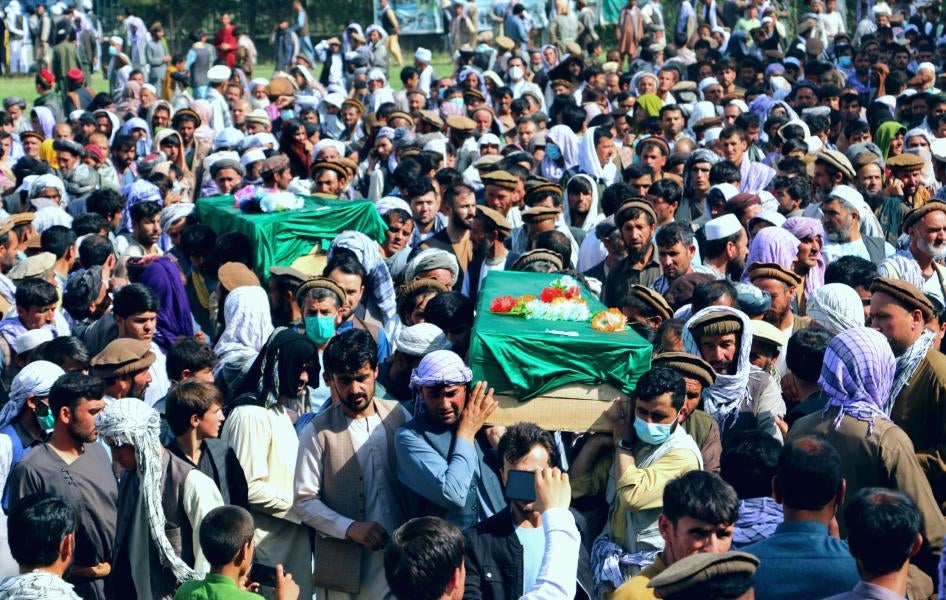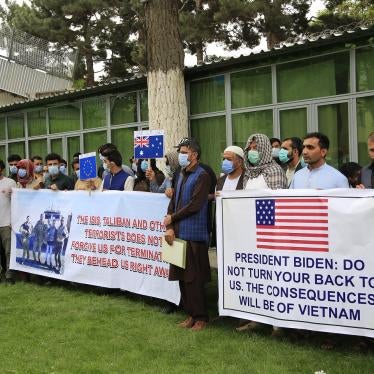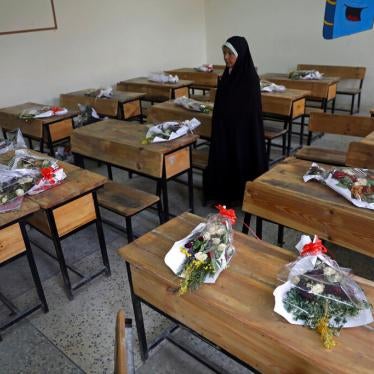(New York) – Taliban forces on the offensive across northern Afghanistan have forcibly displaced residents and burned homes as apparent retaliation for cooperating with the Afghan government, Human Rights Watch said today. Since May 2021, the Taliban have captured scores of district centers throughout the country, including an estimated 150 districts in Kunduz and other northern provinces.
Residents of Bagh-e Sherkat in Kunduz province said that from June 21 to June 25, Taliban forces ordered residents to evacuate and threatened those they said had provided past support to the Afghan government. Taliban fighters looted and burned down homes. The Taliban claimed that they had ordered people to leave “for their own safety,” and denied responsibility for looting or burning houses, but they have frequently committed abuses against civilians for allegedly assisting the government.
“The Taliban’s retaliatory attacks against civilians deemed to have supported the government are an ominous warning about the risk of future atrocities,” said Patricia Gossman, associate Asia director at Human Rights Watch. “The Taliban leadership has the power to stop these abuses by their forces but haven’t shown that they are willing to do so.”
Human Rights Watch interviewed former residents of Bagh-e Sherkat by phone in early July.
Taliban forces entered Bagh-e Sherkat and, with loudspeakers, ordered residents to vacate their homes in two hours. About 400 families fled the town, some going to Taloqan, 70 kilometers east, and about 200 fled to Faizabad, Badakhshan province, 230 kilometers east.
Sirajuddin, a 43-year-old elder, told Human Rights Watch that when he heard the Taliban announcement he hid because he knew they would be looking for him. In 2015, when the Taliban took control of Kunduz city for about two weeks, an Afghan National Army (ANA) commander had ordered him to organize food for soldiers fighting the Taliban. “The commander said, ‘You have to help us – tell the villagers to bring food,’” he said. “So, we collected food and money for the soldiers. Now the Taliban say I have to leave because I helped the ANA.”
Sirajuddin said that shortly after the Taliban announced the deadline for residents to leave, some fighters began searching homes and looting property. “My family left our house and then they burned it with everything in it,” he said. Other villagers said that the Taliban shot and killed two civilians, Abdul Salam, a shopkeeper, and Habibullah, a former member of a local militia force, apparently because of their association with the government. Human Rights Watch could not confirm those killings.
A 45-year-old woman said that after the Taliban announcement, fighters came door-to-door to search the houses. “I told them, ‘I’m a widow. Why are you searching here’ and they said I had to leave because we had helped ‘the infidels.’ I lived in that village 20 years. Now I am in Faizabad living in a tent.”
A 24-year-old woman said the Taliban entered her house demanding to know “Where is the ammunition?” and accusing her family of being government supporters. She said: “We helped the government and they left us to the Taliban. The Taliban have burned our houses. We are so scared – both sides force us to help them. We are poor people – we don’t have any choice.”
International humanitarian law prohibits attacks on civilians and civilian property, including looting and burning. Deliberate attacks on civilians are war crimes. The forced displacement of civilians is unlawful unless required for the security of the affected civilians or is absolutely necessary for military reasons. Retaliatory attacks are a form of collective punishment and are also prohibited.
The International Criminal Court is currently weighing whether to move forward on an investigation into war crimes and serious human rights abuses in Afghanistan by all parties to the conflict, including the Taliban.
Taliban commanders who knew or should have known about abuses by forces under their control and took no action to prevent or stop them are culpable as a matter of command responsibility, Human Rights Watch said.
“Cycles of revenge have fueled atrocity killings in the past, particularly in northern Afghanistan,” Gossman said. “The Taliban should cease all attacks on civilians, and the United Nations and governments pushing for a resumption of peace negotiations should press them to do so.”









